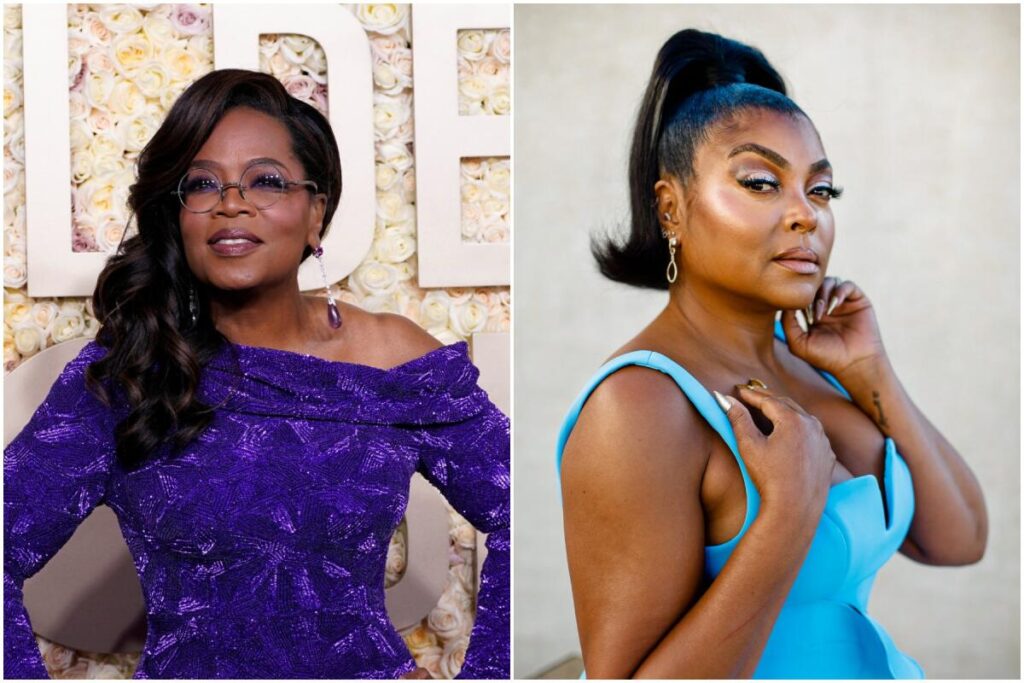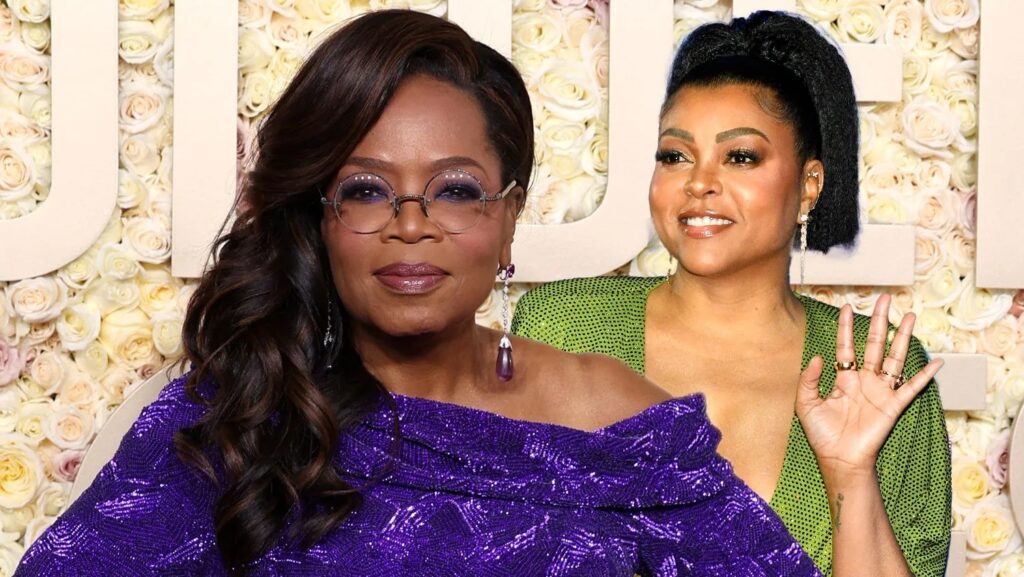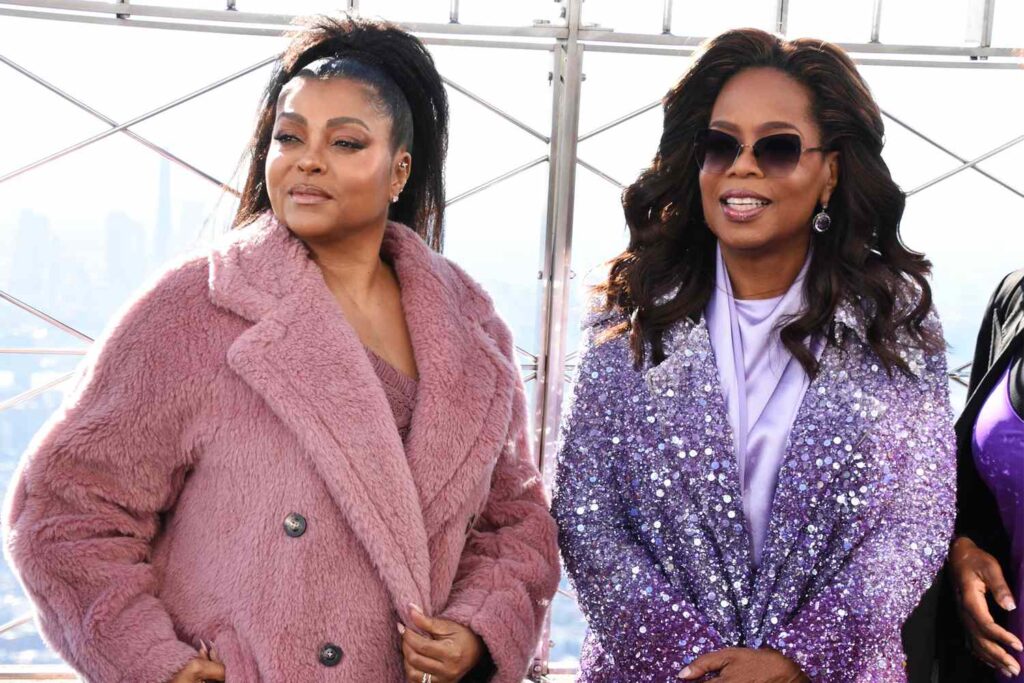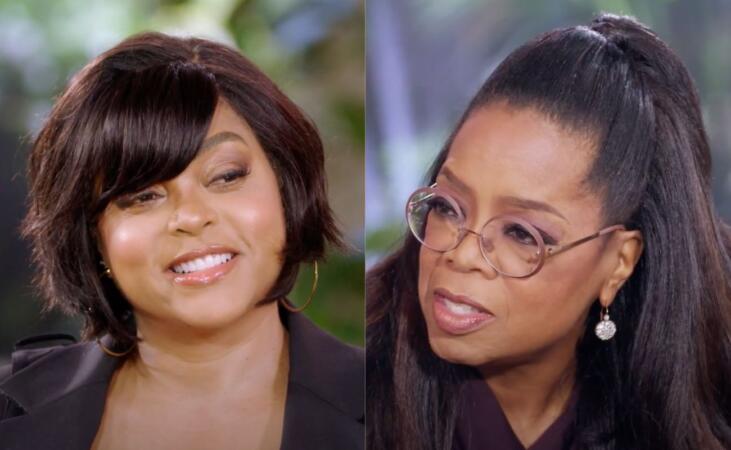Just as it seemed the tension between Saraji and Oprah was easing, fresh reports emerge suggesting Oprah escalated matters by publicly criticizing Saraji and holding her responsible for the lackluster performance of “The Color Purple” at the box office. Despite extensive promotion, the film fell far short of its $140 million budget, barely recouping half of it over a month since its release. The latest accounts indicate that the movie’s downturn was exacerbated by its poor box office showing, with producers now attributing its failure to Saraji’s remarks during the promotional tour.
When Taji first began speaking out and exposing the issues she faced with Oprah and the movie producers, Oprah attempted some damage control. However, none of these efforts seemed to stick. Sources suggest that certain Hollywood executives, along with Oprah, are already conspiring to blacklist Saraji due to the substantial financial losses incurred from the negative publicity surrounding her vocal criticisms of pay inequality in the movie. “I’m at a loss. Why am I even a part of this conversation?” As many of you are aware, Taraji and Oprah had a confrontation about a month ago when Taraji revealed that Oprah had been underpaying her for her role in “The Color Purple.” She disclosed that her salary hadn’t seen an increase since “Proud Mary,” released six years prior. Taraji even turned down the initial offer to star in “The Color Purple” due to its disrespectfully low terms. “As a black woman, we carry ourselves with grace yet are compensated far below our worth, making it challenging. I’ve not seen a pay raise since ‘Proud Mary,’ and I nearly walked away from ‘The Color Purple.’ Yes, I’m tired of exerting so much effort, demonstrating grace in my work, and receiving only a fraction of what I deserve. If I don’t advocate for those following behind me, then what am I doing? I’m sorry, no, I shouldn’t apologize. And then they say my appeal doesn’t translate overseas. Yes, I’ve been hearing that throughout my entire career, over 20 years in the industry, and it’s disheartening. I witness the discrepancies in treatment between productions. It’s time we put this to rest; the excuses of not having funds when it’s a black woman leading the charge. We’ve overcome numerous obstacles, often being paid less, yet we persist with grace. But when we speak out too much, we’re labeled as angry. I’m here to impart some wisdom.”

During a fiery interview with the New York Times, she disclosed that she and her fellow cast members were provided rental cars for commuting to and from the set each day. “The source of contention stems from several factors. Firstly, the actors often endure grueling 12 to 16-hour workdays, leaving them too drained to tackle lengthy drives home after wrapping up on set. Moreover, there’s the concerning aspect of celebrities navigating without security, posing inherent risks. Additionally, these rental vehicles come with the burden that any damages incurred will be deducted from the already meager paychecks of the actors,” she elaborated. Taji expressed her concerns, stating, “I can’t fathom driving solo to the Atlanta set—it’s a liability and perilous. It’s akin to being robbed. Why should I be expected to drive myself to work in a rental car? I simply requested a driver or security for safety. It’s not an unreasonable ask.” She further recounted her struggle on the set of ‘Empire’, where she had to advocate for trailers free from bug infestations.
Then there was that widely circulated video on TikTok featuring a body language analyst decoding the uncomfortable interactions between Oprah and Saraji during a promotional event for their movie, seemingly confirming underlying tension between them. The analyst delved into the nuances of their nonverbal cues, highlighting moments such as Oprah’s fleeting glance at Saraji followed by a quick withdrawal, and Saraji’s body language indicating emotional distress despite attempting to maintain professionalism by leaning towards Oprah. Oprah’s defensive posture and attempts to distance herself were noted, including a staged laugh as a means of diffusing tension. Saraji’s visible frustration contrasted with Oprah’s sudden shift to a more open demeanor, seemingly directed towards the audience, as if to reassure them that the ordeal was almost over. The analyst also pointed out Oprah’s unusual physical contact, suggesting discomfort or a desire to control the narrative. Overall, the analyst concluded that the exchange was significant enough to potentially generate negative publicity for the movie, exacerbated by the forced cheeriness evident in their singing at the event.

Danielle Brooks recently called out the entire production team for their lack of provisions on set, including sharing a single trailer among the cast. Brooks disclosed this during an interview with Taji and Oprah, where she, Fantasia, Taji, Sierra, and others had to rotate the use of the same trailer for changing and preparation. Oprah’s reaction spoke volumes as she quickly stepped in to address the situation. Brooks praised Oprah for her intervention, recalling how she swiftly rectified the situation after being made aware of it. Brooks commended Oprah for being a guiding voice and standing up for the cast’s needs, emphasizing the importance of speaking up for oneself, particularly in a studio film setting. She expressed gratitude for Oprah’s genuine support and sisterhood, highlighting the authenticity of their bond.
When Oprah witnessed the escalating situation, she grew concerned that the negative publicity could jeopardize the movie’s box office success. To mitigate the damage, she reportedly urged Taji to retract her statements. Subsequently, Taraji shared a photo of herself and Oprah from the press tour, describing Oprah as a guiding light and commending her support. Taraji stated, “Miss Oprah has been an unwavering beacon of support for the entire cast of ‘The Color Purple.’ She personally encouraged me to reach out whenever needed, and I did. It only took one call, one conversation, and one decisive woman of color to make me feel understood.” Oprah reciprocated by praising Taraji in her own post and welcoming her into the sisterhood. Despite Oprah’s earnest efforts to salvage the film’s reputation, the negative publicity ultimately overshadowed its success, resulting in poor performance at the box office.
The movie had a strong start, pulling in over 18 million dollars on its opening day. However, its success was short-lived as it began to decline rapidly thereafter. Despite a budget of over $100 million, with $40 million allocated for promotion, its total gross since release has only reached $58 million. Insider sources claim that executives at Warner Brothers are blaming Taraji P. Henson for the film’s underperformance, accusing her of sabotaging promotional efforts with her outspokenness. There are even talks of blacklisting her to deter other black actors from similar actions. Critics also point fingers at Oprah Winfrey for failing to reign in Henson’s behavior. Additionally, allegations have surfaced that Oprah exaggerated the film’s opening day earnings, which IMDb reports as $11 million, not $18 million. Furthermore, it’s revealed that only a portion of the gross earnings goes to the studio, with theaters claiming half. This means that despite the $58 million gross, the studio’s share is much lower, estimated at around $24 million. With a hefty budget and marketing expenses, the film is projected to have incurred significant losses, possibly exceeding $75 million.
Oh, but the scoop wasn’t complete yet as they were still dishing out all the details. Reportedly, this movie was meant to mark Oprah’s triumphant return to the industry with her production company, Harpo Film Studios, following the disappointing performances of her last two productions, “The Immortal Life of Henrietta Lacks” and “Beloved,” which tanked at the box office. However, Saraji’s actions threw a wrench in the works. “The Color Purple” was supposed to be the standout success for Oprah’s Harpo Film Studios. Instead, it’s turning into a major setback for both the studio and Oprah. Well, I suppose this spells the end of the road for Taji in her career, as her outspokenness achieved the exact opposite of what she had hoped. She’s managed to irk not just Oprah but a slew of executives, and they’re not likely to let this go without making an example out of her.

“Predictably, there was no shortage of opinions swirling around this debacle. Take, for instance, one individual who remarked, ‘Saraji single-handedly contributed to the downfall of this film. It seemed she had little regard for her fellow actors and actresses. It would have been wise for her to negotiate salaries based on past box office performances, so her lack of effort to ensure the success of the movie was shortsighted. Saraji’s absence from award nominations, likely due to her supporting role, may have fueled her subsequent public grievances. Regarding the film’s reception, it’s evident that the resistance stemmed from a reluctance towards remakes. This entire ordeal serves as yet another illustration of the unfortunate tendency for members of the black community to undermine each other.’
Another commentator expressed concern for Taji P’s future prospects, noting, ‘My worry for Taji P is that her career opportunities may dwindle. The film’s promotion was overshadowed by her outspoken comments. Nearly every headline focused on Teraji’s alleged underpayment by Warner Bros or the perceived lack of recognition.’
Now, let’s open the floor to your perspectives. What are your thoughts on Oprah’s criticism of Taji regarding ‘The Color Purple’ flop? And do you believe Taji’s career is truly at risk of decline from here? Share your insights in the comments below
